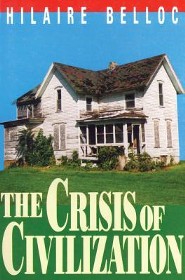
Adapted from a series of lectures Belloc delivered at Fordham College in 1937,
The Crisis of Civilization
is essentially a distillation of his view of European history. By his
account, the fall of classical civilization was ameliorated by the
preservation and defense of the best part of ancient culture combined
with a new spiritual unity in the Middle Ages. The decline of the
medieval order resulted in the dissolution of Christendom during the
Reformation, which directly inspired the new slavery of capitalism and
the horrors of its offspring, communism. This is, needless to say, very
different from the "Whig history" conventionally accepted in Belloc's
time, and different from the presentist biases of our own postmodern
era. Its only defense, Belloc might say, is that it is true.
Belloc's primary concern is social, which means that it is,
inevitably, ethical. The rise of the modern absolutist state, he
claims, dissolved the intermediary institutions that formerly tied men
together in bonds of fellowship, thereby exposing the poor to the
tyranny of the usurious rich. The former order, based on a hierarchy of
values, was replaced by a materialistic hierarchy of wealth. Belloc's
concern is for the dispossessed masses who, themselves the victims of
private monopolies, are attracted to utopian dreams of socialist
monopoly. His antidote is a system of small property. Government must
be enlisted to encourage small business and small landholdings against
the natural advantages modern technology gives to massive
conglomerates. Most of all, he insists on the need for a renewal of
morality which opposes usury and plutocracy.
The book is easy to read but thick with ideas. The ideal historical companion to Belloc's
The Servile State.


No comments:
Post a Comment